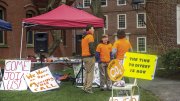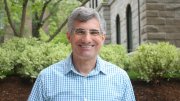Advocates of divesting Harvard’s endowment investments in the fossil-fuel industry—part of a movement urging such action by schools nationwide—have bedeviled University administrators all year. On October 3, President Drew Faust issued a statement calling climate change “one of the world’s most consequential challenges”—but expressing the belief that divestment is neither “warranted or wise.” Instead, she sketched, broadly, Harvard’s role in teaching and research on the environment; its efforts to reduce its greenhouse-gas emissions; and the role of Harvard Management Company’s (HMC) new vice president for evaluating environmental, social, and governance (ESG) factors in investing.
Lacking further details (and the commitment to divestment they sought), advocates continued their campaign, seeking open forums for discussion of their cause. Faust responded with another statement on April 7. She wrote that The Harvard Campaign had raised $120 million for work on energy and the environment, but disclosed no details. (Two gifts apparently figure significantly in that sum. One, totaling $31 million to support the Center for the Environment, appeared in the 2013 annual financial report of the Faculty of Arts and Sciences [FAS], but has not been further characterized. Another, possibly larger, gift—no figure has been disclosed—is Evergrande Group’s endowment and operating support for the new, Graduate School of Design-based Center for Green Buildings and Cities; for a fuller report on the nascent center and what is known about the gift, see https://harvardmagazine.com/2014/05/harvard-research-center-greener-buildings.)
Faust’s message linked to a graphic on various University research programs. She announced an initial $1 million in innovation grants (a favored recent tool to jump-start campus-based entrepreneurship) for faculty and student projects. And Harvard, she added, would sign the United Nations-supported Principles for Responsible Investment (PRI; voluntary principles for ESG analysis of investments) and the Carbon Disclosure Project (CDP), a nonprofit that seeks information on businesses’ energy use and greenhouse-gas emissions.
The same day, the news office unleashed a supportive barrage of Harvard Gazette articles detailing professors’ recent climate- and energy-related research, policy guidance, and work on related issues. Placards mounted on A-frames around the Science Center Plaza touted the University’s own sustainability goals and progress toward its target of reducing emissions by 30 percent.
All this proved a skirmish in the continuing disagreements. On April 10, Harvard Faculty for Divestment released their own “Open Letter” to Faust and the Corporation. Referring to the October 3 and April 7 missives rejecting divestment, the 100 or so signers, from diverse disciplines and schools, declared, “We believe that the Corporation is making a decision that in the long run will not serve the University well.” If fossil-fuel divestment is a “political” act, the letter went on, “continued investment is a similarly political act,” and then laid out the authors’ case—legal, scientific, and ethical—for selling the securities.
Faust e-mailed back, coolly and succinctly, acknowledging “a variety of differing views.” On April 28, the faculty members acknowledged (and published) her note; asked her and the Corporation to “answer the specific questions” they had raised earlier; and expressed the “hope that you will engage and respond to the substantive issues”—particularly in light of expert faculty members’ view of the PRI and CDP as “utterly ineffective.”
Amid the e-mail volleys, and absent any open forum for airing such views, student divestment advocates did what students do in the spring: stepped up their public protests at Massachusetts Hall, the offices for the president and her staff. On May 1, Divest Harvard members blocked both the front door and side entrances, interfering with access to work for one of Faust’s aides, and an undergraduate was arrested. The pro-divestment professors promptly hailed this “act of civil disobedience” and reiterated the call for “an open forum” with Corporation and faculty members, students, and alumni, “for dialogue and conversation.”
In remarks at the May 6 FAS meeting, Faust addressed the situation tersely. She respected protestors’ free-speech rights, she said, but a “blockade” infringes on others’ rights and crosses into a “different zone.” She had met with divestment advocates seven times, she disclosed, and the Corporation Committee on Shareholder Responsibility had done so three times. She supported “reasoned and civil discourse,” but not blocking buildings or “videotaping me and then editing and portraying my words in ways that misrepresent them” (referring to an incident earlier in the semester). In the future, she said with an edge, she looked forward to faculty ideas on climate change rooted in “reason, rigor, respect, and truth.”
To underscore the point, in a subsequent interview she told the Crimson (“Faust Says She Will Work with Faculty, Not Divest Group, to Discuss Climate Change”) that an open forum on the issue was not on the table. The newspaper quoted her characterizing the Divest Harvard demand as “a chance to draw attention to itself,” rather than promoting substantive discourse.
Ratcheting up pressure on the issue, on May 7, Stanford announced its decision not to invest in coal-mining companies, given the severe climate impact of burning that fuel. (Smaller schools had previously decided to divest, but no research universities with Stanford’s heft and large endowment.) Stanford’s advisory panel on the issue includes students, faculty and staff members, and alumni. The trustees endorsed their recommendations, and acknowledged the role of the student Fossil Free Stanford group’s advocacy in catalyzing “an important discussion.” The chair of the trustees’ committee on investment responsibility told The New York Times that the decision on coal “is not the ending point. It’s a process,” as research on alternative energy sources progresses. She amplified, “Don’t interpret this as a pass on other things.”









